The Essential Guide to Pre Powerlifting Competition Eating
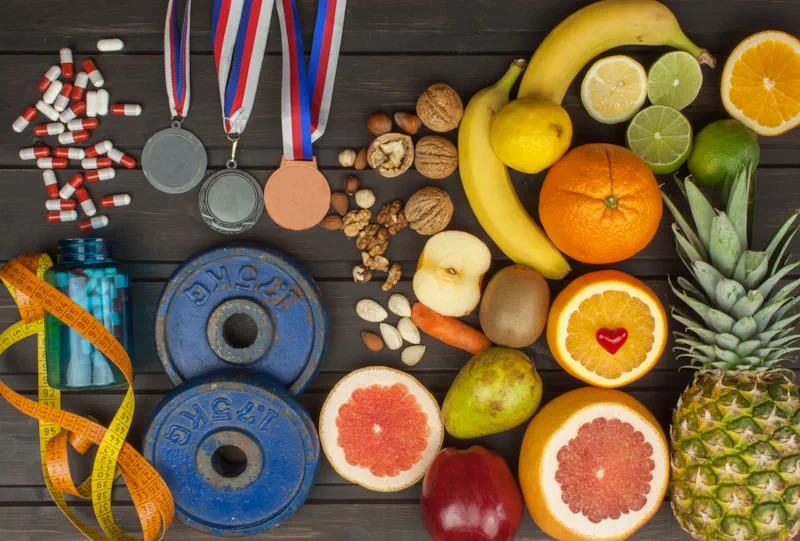
What's In This Article
- Key Takeaways
- Preparing for Powerlifting Success: Pre-Competition Eating Essentials
- The Night Before: Optimal Meal Choices
- Competition Day Nutrition: Timing and Food Selection
- Hydration and Electrolyte Balance
- Caffeine and Pre-Workout Supplements
- Post-Competition Recovery Nutrition
- Summary
- Frequently Asked Questions
Fine-tuning your pre powerlifting competition eating can propel your performance to the top. It’s about what, when, and how much to eat to hit your peak strength without missing a weight class. Learn the essentials of effective nutrition, perfect meal timing, and critical hydration to empower your lifts when you step on the platform, including the importance of fueling your body throughout the day to avoid feeling starved by the time deadlifts come around.
Key Takeaways
Pre-competition nutrition for powerlifters focuses on managing weight classes through calibrating macronutrient intake, fueling glycogen stores with carbohydrates, and optimizing meal composition and timing to sustain energy levels.
- The night before a competition, proper nutrition should consist of complex carbohydrates with lean protein and minimal fats for sustained energy release while avoiding foods that may cause gastrointestinal issues and ensuring adequate hydration.
- On competition day, powerlifters should maintain energy levels with pre-and post-weigh-in meals that are rich in carbs and moderate in protein, snack consistently throughout the day, manage hydration and electrolyte balance, use caffeine and pre-workout supplements judiciously, and follow up with post-competition recovery nutrition focusing on protein and carbs replenishment.
Preparing for Powerlifting Success: Pre-Competition Eating Essentials
Achieving powerlifting triumphs goes beyond intense training; it equally involves intelligent eating. The right nutrition plan, specifically sports nutrition, can fuel your workouts, aid recovery, and help you stay within your desired weight class. But what should powerlifters eat? It’s not as simple as consuming enough food; it’s about choosing the right food and timing your meals strategically. This involves a delicate balance of macronutrients - carbohydrates for energy, protein for building and maintaining muscle mass, and fats for their role in hormone production and overall health.
From energy bars to pre workout meals, every dietary decision a powerlifter makes impacts their sports performance.
Weight Class Management
Similar to boxing or wrestling, powerlifting also utilizes weight classes. Staying within your desired weight class while maintaining strength is a challenging part of the sport. Cutting or gaining weight must be done gradually and healthily to avoid negative impacts on strength and performance.
Estimating your total daily energy expenditure (TDEE) considering your workout frequency and intensity multiplied by basal metabolic rate (BMR) can help manage body weight. A nutritionist or dietitian can provide a personalized plan. Still, generally, powerlifters should aim to consume 1.5-2 grams of protein per kilogram of body weight daily and ensure fats do not exceed 20% of their daily calories. Additionally, it is important for powerlifters to carefully manage their weight class, with a recommended macronutrient breakdown of 5-8 g per kg body weight of carbohydrates, 1.4-2 grams per kg body weight of protein, and 30% of total calories from fat per day. This includes calculating and monitoring their daily calorie intake to ensure it aligns with their weight class goals.
Fueling Glycogen Stores
For a powerlifter, carbohydrates are an indispensable ally. They get stored in your muscles as glycogen, which your body taps into for energy during a workout. Leading up to competition, prioritizing carbohydrates is essential to maximize your glycogen stores, providing energy for those explosive lifts.
Common carb-loading protocols include:
- Following a high-carb diet for 1-6 days with a reduction in exercise
Consuming 4-8 grams of carbs per kilogram of your body weight, which is typically recommended for strength athletes
- Continuing this carbohydrate intake throughout the competition day to maintain your energy levels.
Sustaining Energy Levels
Sustaining energy during a competition equates to the endurance required in running a marathon. It’s not just about the initial burst of energy but also about sustaining it throughout the event. On competition day, meals should consist of:
- low-to-moderate fat
- low fiber
- high carbohydrate
- moderate protein
This combination provides quick and consistent energy while being easily digestible, so you don’t feel sluggish or bloated.
While meal frequency depends on individual preferences, ensuring sufficient calorie intake is crucial for maintaining energy levels.
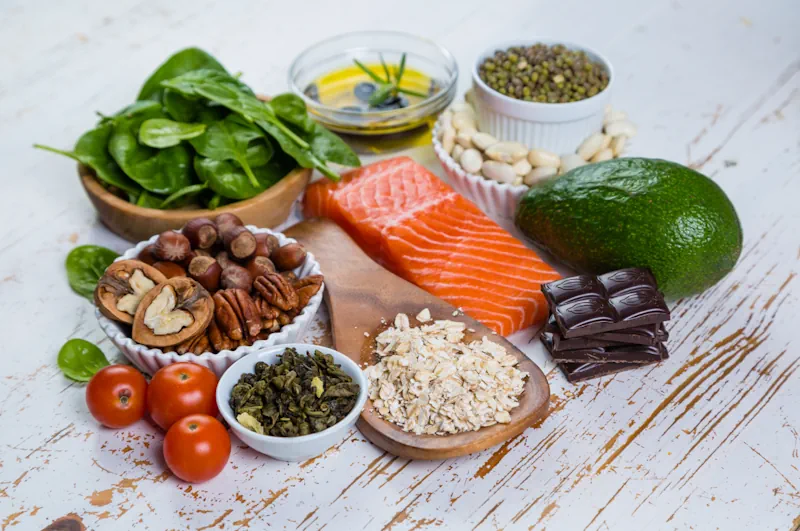
The Night Before: Optimal Meal Choices
The eve of the competition resembles the tranquility preceding a storm. It’s the time to fuel up and prepare your body for the big day. Your meal choices can have a significant impact on your performance, especially when it comes to providing immediate energy. Consuming complex carbohydrates, lean protein, and slightly reduced fat intake can ensure a sustained energy release. Good options for complex carbohydrates include pasta, rice, quinoa, breads, potatoes, sweet potatoes, flour or corn tortillas, and pancakes or waffles. Avoid foods that can cause gastrointestinal distress, such as those high in fat, fiber, or certain spices.
Also, remember to stay well-hydrated, as proper hydration status is crucial for optimal performance.
Carbohydrate Sources
In your pre-competition meal, carbohydrates assume a pivotal part. Whole grains are an excellent source of complex carbohydrates, providing a slow and steady release of energy. Sweet potatoes, another carbohydrate-rich food, also pack in a host of other nutrients to support overall health and performance.
Don’t forget about fruits; their natural sugars can provide a quick energy boost, while their fiber content can keep you full for longer.
Protein Options
Protein, aiding in muscle repair and recovery, is a fundamental component of your pre-competition diet. Lean meats such as chicken, turkey, and lean cuts of beef are excellent protein sources. Fish, particularly salmon, sardines, and tuna, are rich in omega-3 fatty acids, known for their anti-inflammatory properties.
Plant-based proteins such as tofu, beans, and lentils are valuable for vegetarians or those wanting to mix up their protein sources. Finally, don’t forget about egg whites, a fat-free, cholesterol-free source of high-quality protein.
Fats to Include
Despite your focus on carbs and protein, ensure not to overlook your fats. Healthy fats, such as those found in:
- avocados
- olives
- nuts
- seeds
can provide the energy needed for moderate-intensity exercise.
Fatty fish like salmon, sardines, and tuna are rich in omega-3 fatty acids, which can help reduce inflammation and improve vascular function. Replacing high-fat foods with healthier alternatives can help you maintain your performance while providing your body with essential nutrients.
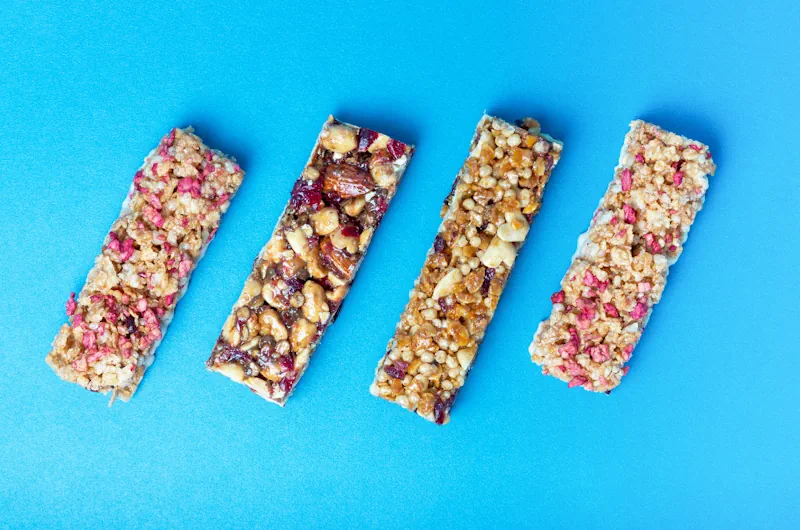
Competition Day Nutrition: Timing and Food Selection
With the arrival of competition day, implement all your training and meet day nutrition strategies. The aim of the day is to keep meals light before weigh-ins and to consume foods that are familiar to avoid any negative impact on performance. Once weigh-ins are done, prioritize carbohydrates and moderate protein intake while keeping fat and fiber low to prevent digestive discomfort. However, after the weigh-in, it is important to focus on gaining back as much weight as possible to compete in your prime state. Eating should be treated like your full-time job, and this is not the time to worry about restricting food or counting calories. Don't go for high-fat foods like eggs, bacon, or butter, and instead opt for plenty of carbs and a protein source like bagels, bread, bananas, crackers, or dried fruit.
The selection of new foods should be easily digestible and provide sustained energy during the competition.
Pre-Weigh-In Meals
Before weigh-ins, your meals should be high in carbohydrates but low to moderate in fat and low in fiber. This is to facilitate easy digestion and minimize the risk of stomach discomfort during the competition. If the weigh-in is first thing in the morning, it’s advisable to wait until after it to eat the first meal.
If the weigh-in is later in the afternoon or evening, eat a meal beforehand to ensure sustained energy for competition.
Post-Weigh-In Refueling
After weigh-ins, it’s time to refuel. Aim to consume 50+g of carbohydrates every two hours after the weigh-in, with goals of 100g-150g of carbs within the first 30 minutes to an hour. Ideal post-weigh-in carbohydrate sources include:
- white rice
- pasta
- white bread
- bagels
- higher-sugar fruits
- fruit juice
- jelly
- crackers
- pretzels
Include lean protein sources such as chicken breast or white fish every 3-4 hours, at around 20-30g per meal, for a higher protein intake. Gradually introduce fats later in the day to prevent gastrointestinal distress. Monitoring your fiber intake is also essential for a balanced diet.
Snacking Throughout the Day
Consistent snacking during the competition day effectively sustains energy levels. Consuming high carbohydrate and moderate protein foods can provide quick energy while not making you feel overly full. Ideal snacks include:
- peanut butter and jelly sandwiches
- trail mix
- energy bars
- granola
- oatmeal
- cereal bars
- bananas
- a variety of other snacks like fruit, sports drinks, yogurt, muesli bars, and sports gels.
Liquid calories from sports drinks can help maintain blood glucose levels and prevent fatigue, especially for those who struggle to consume solid foods during a competition.
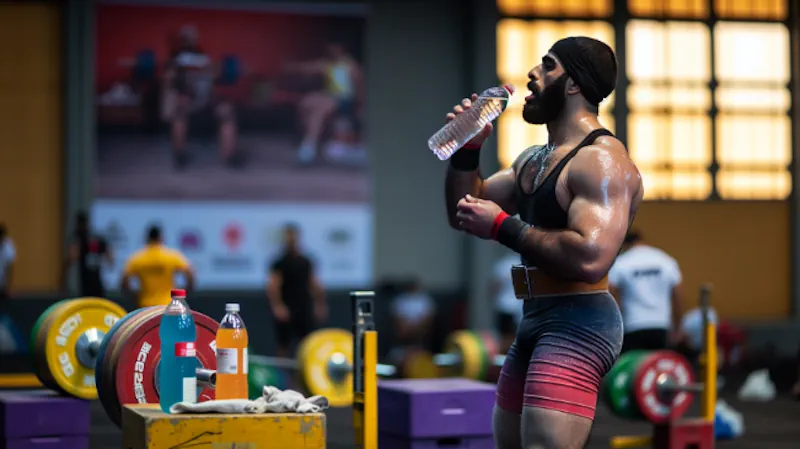
Hydration and Electrolyte Balance
On competition day, hydration and electrolyte balance hold equal importance as nutrition. Proper hydration helps maintain performance, while dehydration can impair your strength. Athletes who have had a water cut should focus on rehydration and replenishment to a state of balanced hydration and glycogen re-synthesis, while those who have not should sip water and/or sports drinks steadily throughout the day. It is crucial to maintain a proper hydration and electrolyte balance, especially at the top level of powerlifting where even small differences in performance can make a significant impact. Water storage is also important, as it is capped at around 1L per hour, making it wise to consume around 1L per hour during the rehydration process.
Drinking solutions like Pedialyte post-weigh-in can aid in replenishing lost sodium and hydration, and also provide carbohydrates.
Water Intake
Water intake plays a crucial role in maintaining hydration during a powerlifting competition. Aim to drink 24 ounces of water or an electrolyte-infused beverage two hours before activity to ensure proper hydration. During the competition, drink water to thirst to avoid dehydration.
Adults should drink 6 to 12 ounces of water every 20 minutes, and teens should consume 11 to 16 ounces in the same period. The goal is to keep body weight loss to less than 2% to maintain performance.
Sports Drinks
Sports drinks are not just for hydrating; they also replenish electrolytes lost through sweating and provide a source of energy from sugar. Different types of sports drinks offer various carbohydrate and electrolyte balances, making them suitable for different stages of a powerlifting competition.
For prolonged activities, sports drinks can be crucial in preventing electrolyte imbalances. Select sports drinks that contain about 200 milligrams of salt per 16-ounce serving and 6% to 8% total carbohydrates, which ensures enough energy replacement during competitions.
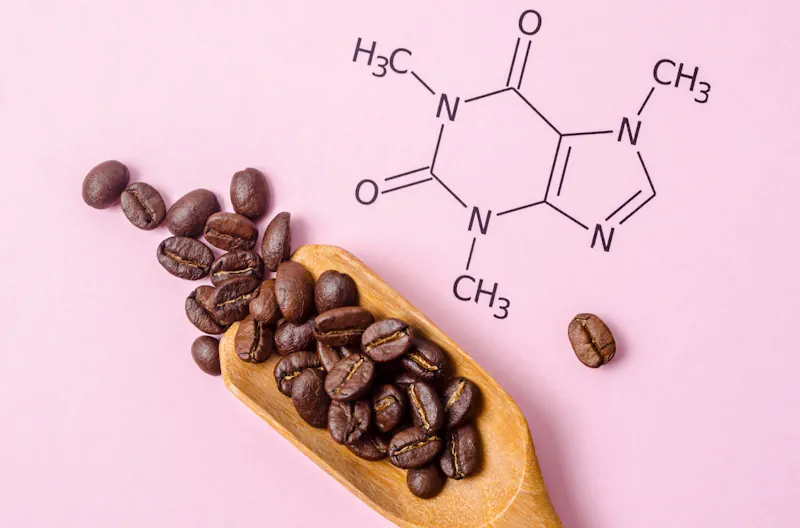
Caffeine and Pre-Workout Supplements
On competition day, caffeine and pre-workout supplements can deliver a much-needed surge in energy. Caffeine has been shown to enhance maximal strength by approximately 3-4% by affecting adenosine receptors, which alter sensations of fatigue and exertion.
Whether through a pre-workout supplement or a shot of espresso, a caffeine kick can help you push through those tough lifts.
Caffeine Dosage
In terms of caffeine intake, the dosage makes a difference. Recommended dosages for powerlifters range from 3-6 milligrams per kilogram of body weight, with a daily maximum not to exceed 400 milligrams. However, the effectiveness of caffeine on exercise performance varies, suggesting powerlifters should individually determine the most effective dosages and consider how much caffeine works best for them, keeping in mind that a 100kg lifter would need roughly 500mg of caffeine, which is equivalent to roughly 5 standard cups of coffee.
Absorption rates are influenced by individual factors such as:
- age
- sex
- hormones
- obesity
- smoking
- diet
- genetic aspects
For optimal timing, caffeine capsules are recommended 60 minutes pre-exercise, and caffeinated chewing gums 10 minutes before activity.
Pre-Workout Supplement Options
Selecting an appropriate pre-workout supplement can radically shift the game in your favor. These supplements, from caffeine to beta-alanine and citrulline malate, are designed to boost energy, focus, and endurance. However, not all pre-workouts are created equal. Some may contain banned substances, so choose supplements certified by reputable organizations. Also, remember to cycle their usage to prevent tolerances from diminishing their effects.
Whether you’re a man or woman, the active ingredients remain the same, but dosage adjustments may be needed based on body weight and caffeine sensitivity.
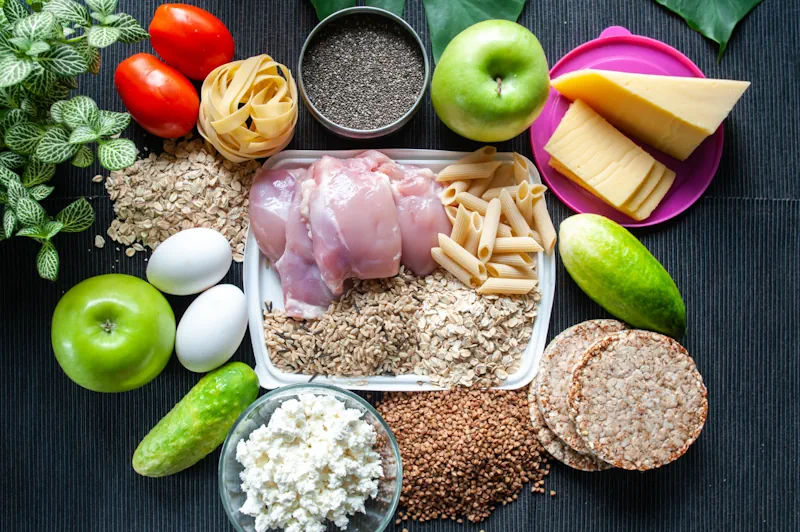
Post-Competition Recovery Nutrition
Though the competition has concluded, your tasks are yet to be completed. Post-competition recovery nutrition is just as crucial as your pre-competition diet. Consuming a meal within 15-30 minutes after the event can aid in optimal recovery. This meal should focus on protein-rich foods and carbohydrates to aid in muscle repair and refueling.
Proper hydration should also be maintained during the recovery period.
Protein-Rich Foods
In the recovery process, protein assumes a crucial role. Including protein in post-competition meals aids in muscle repair and prevents muscle tissue breakdown. Lean meats like chicken and turkey provide high-quality protein for muscle repair. Plant-based proteins such as lentils and quinoa are packed with muscle-building amino acids.
Dairy products, particularly Greek yogurt and cottage cheese provide high-quality protein for muscle growth post-workout,with Greek yogurt also offering probiotics that support gut health for optimal nutrient absorption. Additionally, protein powder can be a convenient alternative for those seeking a quick and easy protein source.
Carbohydrate Sources
Serving as the prime energy source in post-competition meals, carbohydrates are indispensable for muscle refueling. Some options for post-event carbohydrates include:
- Whole grain options such as bagels, pasta, and cereal with low-fat milk
- Fruits like bananas, apples, oranges, and berries
- Starchy vegetables like potatoes and corn
These options can effectively replenish post-event carbohydrates and provide other nutrients.
Consuming sports drinks can aid in muscle glycogen restoration post-exercise when carbohydrate stores are depleted, helping to replenish glycogen stores.
Hydration and Electrolyte Replenishment
Post-competition rehydration is vital to restore normal body water levels and guarantee balanced hydration. Post-activity hydration should correct fluid loss from the competition, with more aggressive fluid and electrolyte consumption encouraged for rapid recovery, especially in cases of severe dehydration. Drinking solutions like Pedialyte or Gatorade post-competition can aid in replenishing lost sodium and hydration and also provide carbohydrates, as recommended by powerlifting expert Bryce Lewis.
During hot weather, diligent hydration and electrolyte replacement are necessary since active athletes can lose between 4-10 liters of water and significant amounts of sodium daily, affecting their sodium intake.
Summary
In the world of powerlifting, it’s not just about the weights you lift; it’s also about the food you eat. From managing your weight class and fueling your glycogen stores to prioritizing carbohydrates and maintaining energy levels, nutrition plays a pivotal role in your powerlifting performance. The right meal choices the night before and on the competition day, along with strategic use of caffeine and pre-workout supplements, can significantly enhance your performance at a powerlifting meet. And let’s not forget post-competition recovery nutrition, vital for muscle repair and refueling. A lot of people assume powerlifters can eat whatever they want, but that's simply not true. Learn more in my article on Do Powerlifters Eat Whatever They Want? Remember, every powerlifter is unique, and what works for one might not work for another. But with the right nutrition strategies, you can ensure that you’re giving your body the best chance to succeed at your next powerlifting meet.
Frequently Asked Questions
What should I eat before a powerlifting comp?
Before a powerlifting competition, focus on consuming plenty of carbs and a protein source, such as bagels, bread, bananas, crackers, dried fruit, lean meat, meat alternatives, protein supplements, or yogurt for optimal energy and muscle support.
Why do powerlifters eat so much before any competition?
Powerlifters eat so much before competition to fuel their performance with high amounts of protein and carbs, enabling muscle growth, energy, and recovery. This helps them meet the physical demands of the competition.
What should I eat before a fitness competition?
For a fitness competition, it's best to eat a meal high in carbohydrates like cereal, pasta, or potatoes and low in fat and protein to provide enough energy for the competition. Avoid consuming high amounts of protein and fat.
What should I eat on the competition day?
On the competition day, focus on light meals before weigh-ins and prioritize carbohydrates and moderate protein intake afterwards for optimal performance.
How can caffeine and pre-workout supplements enhance powerlifting performance?
Caffeine and pre-workout supplements can enhance powerlifting performance by increasing focus, energy, and maximal strength by approximately 3-4%.
